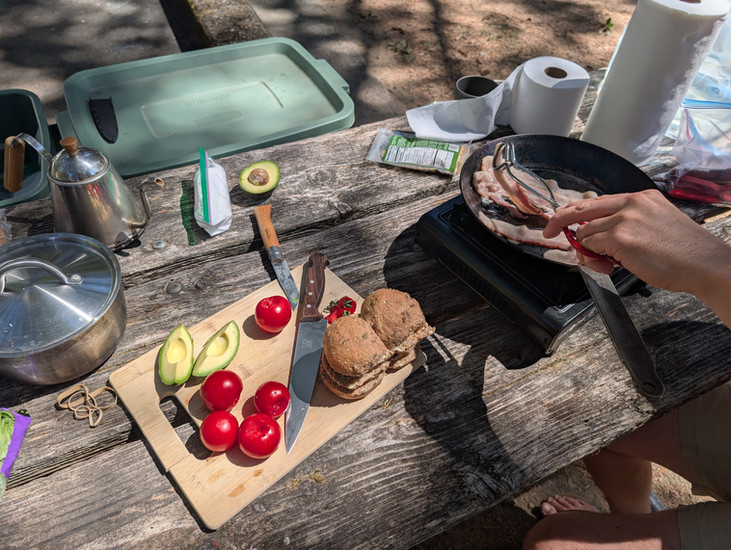Camping, but make it fusion.
- Aug 29, 2025
- 5 min read
I was a camping skeptic. I am not anymore.
by Zhou Fang, Intersectional Group, Intersectional Group, in collaboration with Fridie Outdoors
My first camping experience in the U.S. in the early 2010s burned a mark in my memory - it was cold, damp, and uncomfortable. I didn’t have the right gear and I didn’t know what I was doing. Plus, as Chinese, I grew up learning “Sleeping inside is good. Outside? Not so much.” - wisdom from generations who survived war, famine, cultural revolution, poverty, etc.
Luckily, last year (summer 2024), as I was in rehabilitation from surgeries, I was reintroduced to camping in nature by my boyfriend and my friend Lestarya Tuadi Molloy, founder of Fridie Outdoors (“your go-to app for camping and outdoor skills”) (not a paid ad). I took baby steps: went camping with a group at a fully equipped campground at the Oregon coast organized by Lestarya. It was hard at first. But most of the obstacles I had were in my head: “Will I be cold? Will I be hungry? Will I be able to sleep? Will I be able to use the toilet? Will I be dirty the whole time?” It went on. Of course, had I stopped myself from camping there, we wouldn’t have this article today.
Fast forward to August, 2025, I went on a 2-week road trip with my boyfriend and my dog. Along the way, we camped at: Humbug Mountain State Park in Oregon, the Lost Coast in California, and the Mill Creek Campground in the Redwoods in California. SIX full days in total.
One of the most important things we planned to do and executed well is: Camping, but make it fusion. What does that mean? When we talk about camping food, we usually think about hot dogs, pre-made and packaged foods, canned beans and veggies, protein bars, marshmallows, etc. They are all good options when we are outside and in nature, when resources are limited.
At the same time, as someone who grew up in Asian cuisines (which have a lot of varieties and variations), I had wished that camping food could be more accommodating to my Asian stomach and gut. Lucky for me, while my boyfriend isn’t Asian, he lived in Asia and is a good home cook. For this trip, we planned and prepared to make meals that are Asian, as well as American. We were gonna “mix it up”!
And it worked! In the six days when we camped, we were able to make: Chinese Hotpot (twice), Japanese Curry (twice), American BLT (twice), Salads (two or three times), Steak and Sweet Potato (once), Fancy Ramen (which is a playful take on cup noodles) (once), Sausage and Bacon (once), plus fruits and snacks. Of course, we had marshmallows multiple times at night because what is camping without some burned marshmallows?
One may think: that is so much work and requires so much knowledge. True. Planning and making these meals was a challenge for us. But it was a good challenge. To paraphrase my boyfriend: “We are camping, what else are we going to do?” The essence of camping is being in nature, slowing down, and allowing things to take time. Yes, it took time to make a proper camp fire; yes, the “kitchen” wasn’t as well lit as our home; yes, we needed to be mindful about water and energy consumption; and yes, each meal took much longer than usual. But that was the point! Camping is a reminder that life isn’t just about productivity and “how do we do things faster”. After a 3-hour hike in the mountains or a 1-hour walk on the beach, we want to nourish our body and mind with nutritious and delicious meals.
I would be doing this article a disservice if I didn’t share my observation and reflection on accessibility of camping and being outdoors, both physically and financially. Usually, an established campground has accessible camp sites that are clearly marked with a ♿. Similar for bathrooms and showers. As someone who does not require mobility assistance, I wonder, if camping can be more accommodating for folks with mobility challenges. Camping and outdoor activities can also be expensive for folks who want to have a good experience. And who doesn’t want a good experience being in nature? Through this trip, I learned that many campgrounds require booking ahead of time and fees. Depending on the popularity, the facility, and the state these campgrounds are in, the fees are usually around $10 to $35 a day, plus processing fees on the website. Also, if we need to purchase firewood from a camp host at the campground, it usually costs from $7 to $10 for a bundle that is typically enough for one night. For folks who are from underserved communities, I reckon this condition alone can be prohibitive. Additionally, camping and outdoor gears are generally not affordable.
However, there are ways to lighten the burden. This is where we can experience another aspect of “fusion camping”. For our trip, we had 2 adults and 1 dog. In order to reduce the booking fees, we can always consider camping with friends so that we can share the camping fees and firewood costs. I would also encourage buying used gears from local, independent stores - those can be drastically cheaper than new items and still in good condition. And, if we have friends or family who have the equipment, consider borrowing gears from them. We don’t always have to buy! We can look at borrowing gears as a way to practice alternative economy (vs. capitalism and consumerism). In return, when friends and family are in need, we can help them out, too.
Having read this far, folks might be curious about recommendations for gears and equipment, I am not an expert (yet) and I don’t mention brands. On a high level, after camping a few times now, I think having layers of breathable clothes, gentle and environmentally friendly cleaning supplies, a good pot and pan, drinking water (5 gallon is about enough for 2 adults for 2 days), trash bags (poop bags if bringing your dogs), bug repellent, camp fire wood (be sure to check if a fire is allowed), and a good book (audio counts, too!) would make our camping experience pleasant. If you are looking for professional and accessible advice, I highly recommend using the Fridie Outdoors app (again, not paid).
The bottom line is: Mother nature welcomes us and loves our visits, as long as we are being respectful and appreciative. As my friend Lestarya says, “leaving it (nature) the same or better than when we found it.” We all deserve to enjoy and learn from nature. She generously offers care, healing, beauty, and wisdom to us, and it is up to us to build our relationship with her.
Now, let’s go camping, and make it fusion, too.
Enthusiastically,
Zhou Fang (方舟)




























Comments